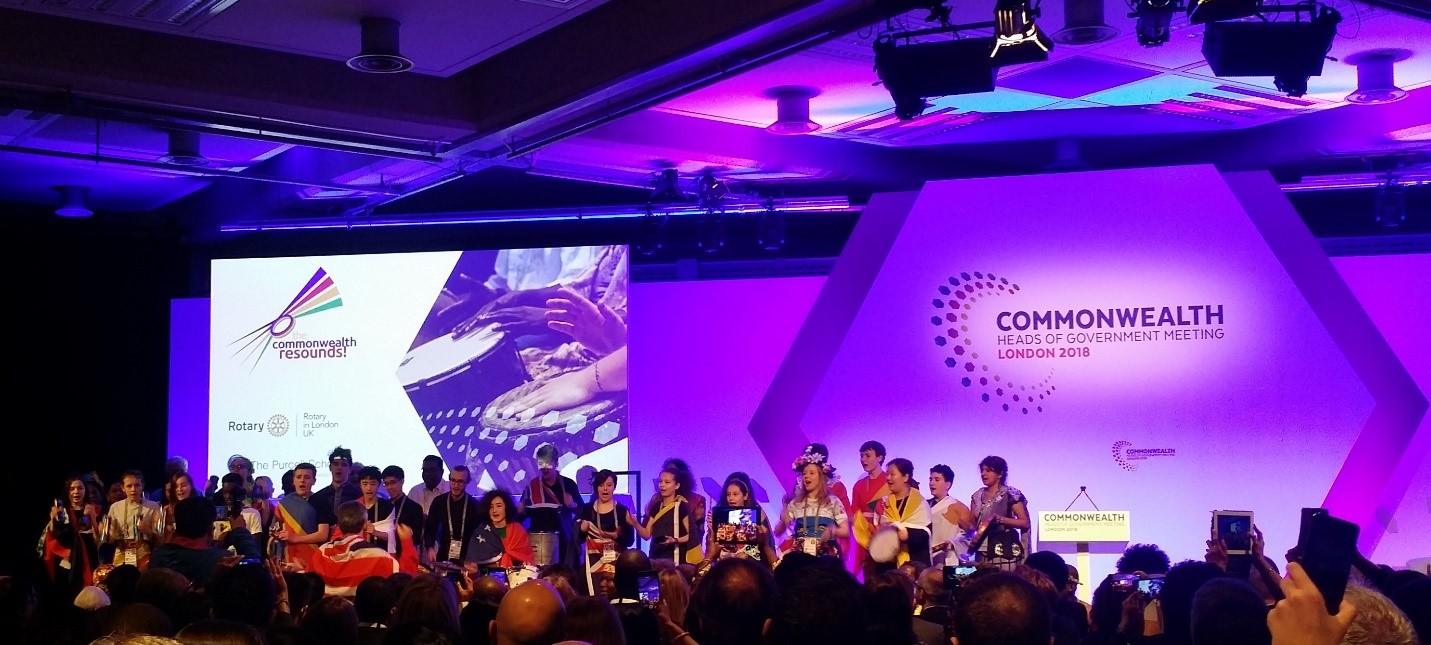Communicating towards a Common Future: A Canadian’s CHOGM Commentary
May 22nd, 2018 – by Alvin Ma, Commonwealth Correspondent, Canada
– by Alvin Ma, Commonwealth Correspondent, Canada
“Who the hottest in the world right now, just touched down in London town.”
Ten years before Commonwealth Youth Ambassador Prince Harry’s wedding to American actress Meghan Markle, British singer Estelle paired up with American rapper Kanye West for this chart-topping song “American Boy.” It was around that time that I participated in my first Commonwealth Essay Competition, in which I told a fictional story detailing the hardship of an Iraqi refugee claimant to the United States.
Since that time, I have read many more factual accounts of difficult journeys from one place to another and, on a daily basis, I interact with people who have left their homelands to pursue better lives in Canada. I have also visited countries spanning four continents in the past few years to communicate my research in the presence of academics and global leaders, most recently at the Commonwealth Youth Forum – a component of the Commonwealth Heads of Government Meeting (CHOGM).
While the guiding theme is “Towards a Common Future,” the reality is that significant disparities exist in the present-day world. It is therefore a tremendous privilege to go through the border security checkpoints with a Canadian passport in my hand, travelling for relatively leisurely purposes, as 65 million people in the world are forcibly displaced from their homes. Billions more – including the citizens of many Commonwealth countries – have strict visa limitations by the accident of birth location even if they gather the funds to travel. I have written another article about the need for more open borders in order to build strong, flourishing communities. Looking beyond the simple economic indicator of tourism revenue, short term visitors also provide vibrancy and, in the case of forums and conferences, communicate valuable insight.
It is unfortunate that in the leadup to CHOGM, several prospective Commonwealth Youth Forum delegates voiced disappointment about their United Kingdom visa application rejections. While the rejections are out of the control of conference organisers, it is disappointing that they could not communicate their knowledge in person. It is also unfortunate that one Canadian friend who enjoyed his occupation at a London airport needed to vacate his flat and return to Canada right before I arrived in London, after multiple unsuccessful attempts to secure an extension of his work permit. Needless to say, migration was a major topic of discussion in light of the British government’s official “hostile environment” policy towards “illegal” immigrants and the wrongful deportation of residents who arrived in the United Kingdom during the “Windrush” era.
One highly-anticipated event for which thousands of delegates queued before the doors opened was the joint plenary session featuring (Dominican-British) Commonwealth Secretary General Patricia Scotland, British Prime Minister Theresa May, (American) founder of Microsoft and philanthropist Bill Gates, and Jamaican Prime Minister Andrew Holness. May’s speech appeared to be progressive regarding the environment, public education, LGBT+ rights, and the desire for international cooperation in halving the cases of malaria in the next five years. As agreeable as her justification for enforcing an “international rule-based system” in the context of intervention in Syria might sound, it was nonetheless a foreign affairs policy direction that raised many questions, particularly since May carefully omitted Brexit in her speech. Although there was a form on the CHOGM online portal for asking questions, it was disappointing that the plenary session panel promptly left the room without answering any questions.
The panel did not even stay to listen to Dr. Karlo Mila – who dared to be critical of the Commonwealth’s flaws in her poetic presentation immediately following Holness’s speech. While invited foreign guests generally refrain from publicly critiquing the host country in keynote speeches, I was surprised to see Holness not only allude to the Windrush issue but also look in the direction of May and say, “We note your undertakings and look forward to the speedy implementation” of a “speedy, thorough, and fair” solution that contributes to Commonwealth subthemes of prosperity, sustainability, security, and fairness. Central to my article last month, Holness also spoke about the potential of sport in realising sustainable development goals. Distinguishing myself to influential diplomats as the educator and researcher who believes Zumba could be a useful tool to achieving world peace, I am proud to find sport mentioned in three different points of the Commonwealth Youth Forum Declaration and Action Plan.
Sometimes people are frustrated with the slow pace of diplomatic resolutions, and actively engaged citizens justifiably protest the conditions negotiated with regimes accused of corruption and serious human rights abuses. Communication comes in many forms – be they the protest messages chanted outside the Queen Elizabeth II Centre or the roundtable discussion ideas generated inside the venue by global leaders. The street where protests were held was turned into celebration with cheering crowds under the hot sun in the last stretch of the London Marathon, urging on runners such as my 60-year-old uncle who finished the 42.2 km route in under five hours. Communication can occur on the streets themselves. On a day trip to visit my former students in Poland, we saw graffiti of the Warsaw Uprising symbol painted on top of other text with extreme political ideas. A few days later, I saw the solidarity of Toronto residents in writing words of encouragement in many languages at a makeshift memorial after a van attack killed ten people along the same road my current students and I walk daily to go to school.
Coming together does not mean that we have to refrain from constructive criticism, for questioning and protest are legitimate forms in communicating towards a common future. While a memorable moment for me was standing mere metres away from Prince Harry during a lunch break, the challenging questions that fellow Commonwealth Youth Forum delegate Angelique Pouponneau boldly poses in her article regarding the future of the Royal Family and the Commonwealth resonate in my mind just as powerfully as the drumming of the “Commonwealth Resounds!” group (composed of members from all 53 Commonwealth countries). Hopefully the drumbeat of progress will resound as we look ahead to CHOGM 2020 in Rwanda.
Photo credit: Alvin Ma




